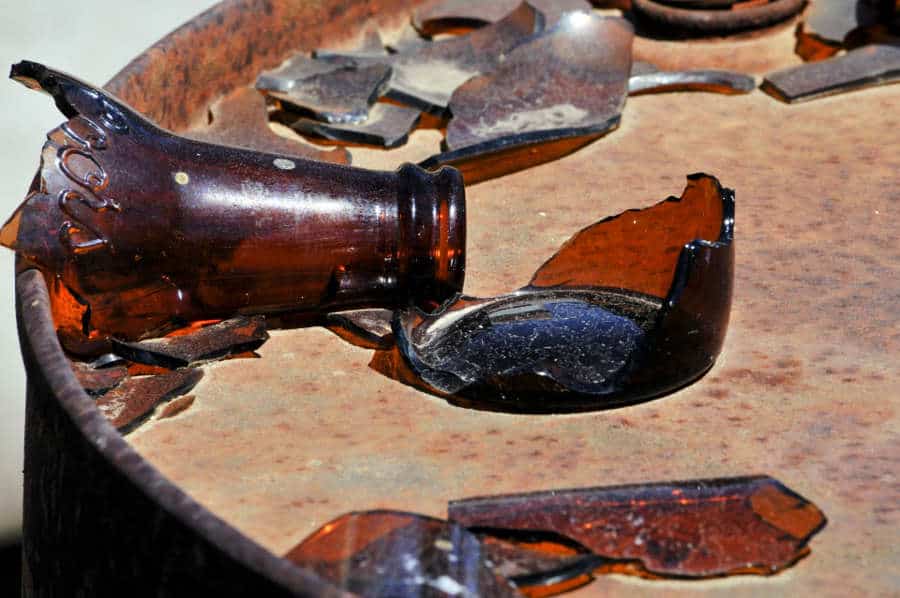I remember it well, you walk into a room with exploded and exploding bottle all around and you just think, what happened? Every new home brewer is in danger of repeating this scene, but there is an easy fix.
So, how do you stop your beer bottles from exploding?
The reason why sealed beer bottles explode is because the pressure within them is too great. This can be due to over-carbonation of the beer at the bottling stage, the bottles themselves are not strong enough or due to improper storage. Fixing these three causes will fix the problem.
There is nothing worse than seeing all your hard work going up in shards of glass and having to see that beautiful beer drip away. It’s important to learn how this can happen to stop it from ever happening, or from happening again. After all, it’s not only extremely annoying it can be bleeding dangerous too!
In this article, I will go through the causes in more detail and give you a clear action to take in order to fix each of them.

Exploding bottles: Bad bottles.
Problem: Poor quality of bottles or the wrong type.
Fix: Use appropriate bottles and caps
Beer is a highly carbonated drink which is giving out a lot of carbon dioxide. That’s no problem when it’s in a glass because that CO2 has somewhere to go. When you put that same tasty beer in a sealed container, you have a pressure bomb on your hands.
Beer bottles are, when properly designed, resilient to the immense pressure that the internal atmosphere of the container is exerting. Using bottles intended for the job is the first course of action to ensuring that you won’t lose bottles to weak glass.
You can recycle old bottles from commercial beer manufacturers (buy beer from local breweries), but be sure that these are not the screw top variety as these are not intended to be recapped. Also, make sure that you purchase quality bottle caps and a decent bottle capper to do the job right.
It’s also important to fill the beer to the right level in the bottle to give it sufficient room to let the CO2 expand into. Follow your beer kit/recipe’s instructions but as a general rule, roughly 1 inch (2.5cm) of headroom is advisable. If you have over-primed your beer, even this may not be adequate space.
Exploding bottles: Too much pressure.
Problem: Beer is producing too much CO2
Fix: Open the bottles to release pressure before resealing them
Exploding bottles can also be happening because there is an excess of pressure within the bottle and more than the supplier was expecting.
This often is the case when the brewer has not allowed the beer enough time to finishes fermenting or if the brewer has added too much additional priming sugars in the bottling stage. (Sorry, this one was on you!)
Next time, ensure that your beer has fully finished the fermentation stage by checking its specific gravity (density compared to water) and seeing if it changes over a 24 -36 hour period. If it doesn’t, bottle it up. if it seems to be changing wait a little longer.
When you are sure that your wort has finished fermentation, it’s time to mix your wort with the priming and bottle it. How much priming sugar you use depends on the temperature of your beer and the CO2 content. When you know these you can calculate them and find out exactly how much priming you need to add.
Exploding bottles: Too much light or heat.
Problem: Hot bottled beer will be under a lot internal pressure.
Fix: Chill the beer or store in a cool dark place to reduce the extra pressure.
Although UV light is normally a cause for concern in terms of taste when it comes to bottled beer, here we are concerned about heat. A hot environment can be troublesome for many stages in a beer’s life.
If you remember that boring science class where your teacher explained that a heated gas becomes more agitated and moves around faster. They also probably explained that liquid expands when heated. That’s two separate elements in the same space with about an inch of height play with.
This means that if you are storing your bottled beer in a warm environment which is also being heated by direct sunlight, there’s gonna be a whole lot of pressure in them bottles.
If this is what has happened, there is a quick fix. You need to cool those bad boys down asap. Move the bottled beer into a storage place which has a regular (and cooler) temperature. Somewhere like a garage or basement should do the trick.
If you live in a hot climate, you may wish to invest in a dedicated refrigerated storage space. A second-hand fridge could be just what you need.
The real danger of exploding beers.
Exploding bottles under extreme pressure is nothing to be sniffed at, in fact, they can be downright dangerous.
There are numerous cases of people being severely hurt in these instances and blinding is not unusual. There have also been numerous cases of people and companies being sued. That’s something to consider before you start giving away your tasty tall ones to friends and family.
If one of your bottles does explode, make sure that you clear the room of anyone who could get hurt, including yourself.
If you have some protective clothing, put it on before you go back to tackle the mess. If you don’t have any protective glasses, put on some sunglasses or hold something up against your face.
Put something on to cover any exposed skin and wear gloves if you have them to hand. Be careful of broken glass and the possibility of more exploding bottles.
Once you are protected, follow the advIce I gave for solving the problem you personally have with your batch. Really do take care of yourself because you are irreplaceable and we can always make more beer!
Other ways you could lose your homemade beer.
In addition to exploding bottles due to poor quality bottles, over-carbonation at the priming stage or just a hot and light storage room, there are other ways you could lose that beer.
If, when you finally can, you taste the beer and it tastes a little off, then you may have had a beer infection during the fermentation phase of your brew. If it tastes like vinegar or a little yeasty then it’s a sure sign that something didn’t go well at all this time. Check out this article for more information on how to proceed.
Related Questions
Why did my fermenter explode?
Your fermenter may explode or blow its lid off during the fermentation stage if the pressure inside it builds up too much. During the fermentation stage, the yeast is actively transforming sugars int he wort into both ethanol (yay!) and CO2. As a gas, the CO2 is looking for an escape route and if it doesn’t have one it will force an exit.
In order to fix this, you can leave a lid on the fermenter without sealing it in the early stages of the fermentation period. Usually, though, you need to have an airlock in use. If this becomes clogged for any reason you run the risk on a similar explosion. Just make sure you can see the airlock bubbling away during the estimated time of your fermentation phase.
If you are having an issue with slow or unusual fermentation, check out my article on the subject for some fixes and tips.
How long should I let beer carbonate for?
An average beer which has been subjected to the natural carbonation process by the adding of priming should be ready to drink after about 3 weeks. Each beer is different and the supplier of your recipe will clearly indicate the estimated time of this process.
However, as a new brewer, it is suggested that during some of your initial batches that you taste the beer every so often to appreciate how the beer changes with time.
If on opening your beers you notice that the beer gushes out or seem to produce too much foam then you may have miscalculated the amount of priming to add on bottling. If this is the case you can check out another article I wrote that deals with this problem with some easy solutions.





